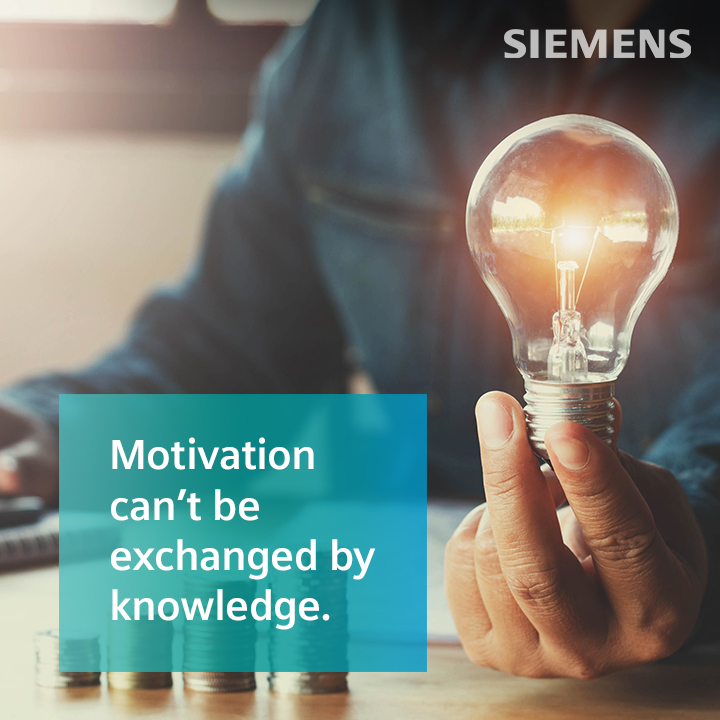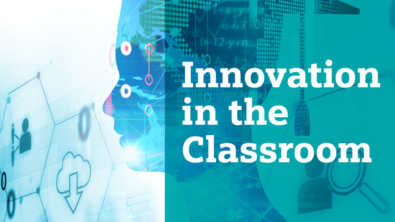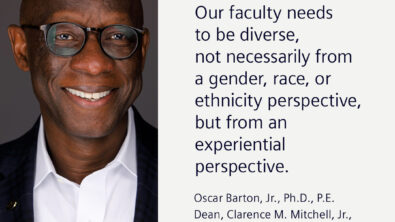Podcast Transcript: Bridging the Gap with Stephan Groß and Enes Öksüz

Now, blending industry with academia is more important than ever. What has already been done in the engineering discipline to bridge the gap between industry and academia? What do we still need to work on to achieve this?
Join Jennifer Bradford in this special episode of Innovation In The Classroom where she is joined by guests Stephan Groß (Gross) and Enes (Enis) Öksüz, talking about seizing hands-on opportunities in the industry while they were engineering students in Germany.
Enes studies mechanical engineering at RWTH Aachen University while also interning at Mercedes. Stephan finished his masters in mechanical engineering at DHBW Mannheim as an ABB student employee.
Both Enes and Stephan shared their 12-month experience with the Siemens-supported student competition teams and how the competition teams helped them enhance their problem-solving skills, set team goals, and blend theory from academia with practice in industry.
In this episode of Innovation in the Classroom, Jennifer, Stephan, and Enes discuss:
- The importance of application in academia
- The importance of extracurriculars like Siemens student competition teams
- Why money isn’t everything
- How to expand your horizons outside of education
- How to stand out from other students for future employment
- How to set small steps to spotlight the end-goal
“The other thing is to look ahead, but not too far. Just picture your very next step.”
Stephan Groß (Gross)
“If you have a lot of people who are passionate about the things they do or happy with the work they do. They will always do their work better than someone who just to earn the money and then go home.”
Enes (Enis) Öksüz
Podcast Transcript
Dora Smith: Welcome to Innovation In The Classroom by the Siemens Empowers Education Team. I’m Dora Smith.
Now, more than ever, we’re realizing the importance of blending industry with academia. Doing this holds value in all disciplines, and engineering is no exception. So what’s already being done and what do we still need to work on to achieve this? Join Jennifer Bradford in this special episode of Innovation In The Classroom where she is joined by guests Stephan Groß (Gross) and Enes (Enis) Öksüz. They are here to speak about their own experiences as engineering students in Germany and how their exposure to industry whilst studying broadened their horizons and opened doors for them that they didn’t even know existed.
Enes (Enis) Öksüz: I think, especially for people who don’t really know what they want to do at the end of their degree, or when they get their degree, I think it’s really important to have a good insight in all the positions and the things you can do to choose what suits you best. And it’s also like beneficial for the industry. If you have a lot of people who are passionate about the things they do or happy with the work they do, they will always do their work better than someone who just is there to earn the money and then go home.
Jennifer Bradford: Enes studies mechanical engineering at RWTH Aachen University whilst also interning at Mercedes. He credits his internship for helping him develop his problem solving skills, however, as I’m sure we can all imagine, studying and interning simultaneously can also be difficult to manage. So how does Enes cope?
Enes (Enis) Öksüz: So what I am trying to do is to plan my whole semester to set my goals regarding my study spirit, the amount of exams I want to pass at the end of the semester, but also the things I want to do at Mercedes, and try to schedule my weeks and months and trying to get everything. And one thing at but also, one important thing I’m trying to consider is to give myself enough rest and yeah time to recharge, so that I won’t be depleted after one or two months. Yeah, which is really important.
Jennifer Bradford: Stephan recently completed his masters in engineering at DHBW Mannheim where he was an ABB student employee. This meant, like Enes, he was interning and studying at the same time. Stephan summed up his ABB student experience as having more money, but less time than the average student. I asked him how important he thought free time was in avoiding burnout and how he was able to manage with less of it.
Stephan Groß (Gross): From my point of view, especially regarding burnouts, COVID hit us all very, very hard. Among my fellow students, there were several cases who just dropped out for a semester or more, just because, yes, the situation has changed. But this differs from- from one to another. If it comes to my situation, it goes all down to efficiency, I was able to manage my time quite efficiently. So I could fit in breaks, really time outs for myself, where I would not do anything for my job, not do anything for my studies and just disconnect from the world. Sometimes you have to plan those occasions really, really good. But sometimes, you can just drop everything and leave. And you will always come back, more fit for the work ahead. And what also helped me a great deal is to look behind to just see what I have accomplished, especially when I was tired and might have been feeling a bit of burnout. And the other thing is to look ahead, but not too far. Just picture your very next step. And so the amount of work does not seem that incredibly big, and un-copeable. So if you just take small steps and look behind what you have achieved, then this will not stop you.
Jennifer Bradford: One of the ways in which Siemens empowers students is through supporting student competition teams where, within a 12-month period, students are expected to build, test, and develop a racecar. They are provided with free training and industry software to enable project-based, hands-on learning and to encourage innovation, collaboration, creativity, communication, and problem solving. Enes and Stephan were both a part of these teams, with Enes describing the competition as Formula One by and for students.
Enes (Enis) Öksüz: I think one important thing is that say the way how the team works, you need to be very agile, and also reactive to unpredictable situations which can occur at any time, one week, everything is fine, and the other, everything just goes down the hill. And then you need to get somehow creative, keep your head cool, and try to solve problems and keep the team also to get at it to not just you panic, but also the team starts to panic. It’s really important to be some kind of role model who’s always calm and says, okay, it’s okay that this happened. We need to move further. But difference- or a huge difference is the amount of experience that people have, and also the amount of time the people spent in the team. I think Formula Student is really, let’s say short-lived. There, most of the people just spend one or two years in the team, and I think that’s a big difference. You can’t build up, let’s say, good talents and keep them in the team because at some point, they are finished with their studies or have bigger challenges they want to face. But I think in Formula One, Formula One is one of the biggest challenges you can face as an engineer, but also the time that people spend is much longer than former student.
Jennifer Bradford: So these teams are a great learning experience, but they can be very intensive. I asked Stephan about the type of mindset needed to ensure success in these student competitions.
Stephan Groß (Gross): One of the most important things is that you have a common goal in your team. This just ensures the focus, of course, we all have to work to make a living basically. But if you have that intrinsic motivation, this cannot be replaced by anything. Motivation can’t be exchanged by knowledge or anything. Because knowledge by itself does not build anything. But motivation might lead you to knowledge in a certain area. And when this motivation is there, you go all in for the project, you focus on building your baby, basically, realizing what you have been dreaming of. And this just pushes you through all the highs and lows, that Enes mentioned, when there is a drawback, you might even give an extra push and invest even more of your time to just overcome all the obstacles. And this is something- when you can transfer this motivation from a student project to your daily life and to your daily work, then you’re basically unstoppable. And this is something I was always looking for in the nearly six years of formula students. Now, this is what I guess I have found within my team now that I’m working for Siemens.
Jennifer Bradford: Part of Siemens’ involvement in these teams is to partner Siemens employees with students to impart advice and guide them through the experience. Enes described how he was able to gain valuable insight from his Siemens partner – insight that involved exposing him to experiences outside of his typical studies. I asked him how this sets him apart from other students who choose not to participate in these types of extracurriculars.
Enes (Enis) Öksüz: I think one ability is to seize opportunities in the moment and to recognize them. Sometimes it’s like I have the feeling that my colleagues, they have, let’s say a goal where they want to be at the end of their studies, and they just see one way to get there. But there are many ways which need to go, maybe you need to go around two or three corners. But I think a lot of people are just kind of stuck on and just see one way and everything which, let’s say diverse from this way or path, they just don’t see it as leading to their goal. But sometimes, in my opinion, you need to take a risk or to be open to maybe have a look how this other path could lead or where this other path could lead. And maybe it’s something which is also fulfilling yourself.
Jennifer Bradford: But taking these kinds of risks can be daunting – especially as first-time college students where there’s a tendency to spotlight the end-goal (graduating and getting a job) with everything else falling into the shadows. This is what Enes’ parents expected from him, as a first-generation university student, and so I asked him how he was able to convince them of the importance of extracurriculars like student teams.
Enes (Enis) Öksüz: I think there wasn’t really a convincing point or something like that. It was more like a fluid transition. They first just tolerated the things I did and were like, yeah, okay, he will do it a month or two and then we’ll be done. But they saw how much time and work I put in there and at some point, they also saw how it made me some Yeah, happy but also gave me valuable lessons and helped me to develop myself as an engineer. And also with the wins I had during my time in Formula Student and the things I did outside of the typical university life side, I think they just saw, okay, this, my son is going the right way. And if I let him do his thing, he will find his way.
Jennifer Bradford: Stephan offers a perfect example of how expanding your horizons can lead to substantial wins outside of education. Visualizations and simulations that he put together as a student were noticed by a Siemens employee and, consequently, he was invited to join the Siemens Simcenter group, which he did in March of this year. Stephan has described his experience at Siemens as doing something he loves whilst getting paid for it. And isn’t that what we all aspire to have? So what advice does Stephan have for students to be able to stand out to potential employers in a similar fashion?
Stephan Groß (Gross): Well, I had the rare opportunity to give such advice to some students, which came over at Hannover fair the last week, and they asked me how they might get a job, for example, within Siemens or within other engineering companies. All advice I could give was, don’t search to impress a future employer, go for your goal, and see what inspires you. And then find a job that fits this very fire within yourself the best. Then job offers or job opportunities might come and if you need to apply for them, yes, of course. For example, if you want to go to Formula One, no one is gonna ask you to join a Formula One team, but if you can show that fire that you had for a certain project, then you will greatly increase the chance to stand out while applying for a job.
Jennifer Bradford: So think about what you love to do – your passions, hobbies, or education – what initially drew you to these things? For Enes, it was seeing a Lamborghini at a young age that initiated his interest in engineering. Now, I know most of us can appreciate a nice car when we see one, but what is it that differentiates a future engineer from someone who just appreciates cool cars?
Enes (Enis) Öksüz: I think the difference of what sets you apart is that you also try to understand how it is like be in some basic things like just the looks, or just handle it to try to understand how this mechanism works, why it is shaped like that. I think that’s a huge, let’s say feature of an engineer, which sets you apart from a normal guy. And also some people say engineers also look with their hands, everything they see their child touching it and trying to bend it to understand how it works. And I think that’s something which is part.
Jennifer Bradford: Sometimes, however, the connection between being interested in the mechanics of how things work and pursuing a career in engineering isn’t so easy to make. In these cases, how do we expose potential students to engineering in a way that attracts them to the profession?
Stephan Groß (Gross): I think we could attract future engineers by posing challenges to them by giving those who do not have pursued their own goals, a goal given by others that they can adopt for themselves. For example, make challenges in our software or wherever else for the best design for the best simulation that they can do with our student software, for example, and give them challenges like that. If we outline projects for them, we can maybe even break down the big picture of a huge challenge, for example, which is my huge challenge was how to build a racecar, and break it down to specific problems that students can work on alone or in small groups. When you divide it in small steps, then projects become motivating and doable, basically. And this might lead future engineers to some additional hands-on training at that point.
Jennifer Bradford: And on the other side of things, how can we expose engineering students to industry in a meaningful way? I asked Stephan what his biggest takeaways were from working in industry alongside his academic studies.
Stephan Groß (Gross): In Germany, we have proverb for this. Everybody’s only cooking with water. And it basically says that problems are not that uncommon, that problems are basically the same everywhere. And so are the methods- methods to overcome them. So when you go to university with your academic mindset, you will soon notice that at some point, it’s not only a theory, but it’s more application, and it goes down to hands-on stuff, you need practical things. At university it does not matter how long it takes to find a solution. But when you go to industry, time is always critical. Because time is money, yes, of course. And if the production line stops, no one is going to wait for two weeks to have an engineer find out the perfect solution. You need a 30 minute fix to have the production line running again. And then you can take two weeks to reduce the amount of failure or something else. So this is a very important lesson that universities sometimes does not teach you. But they hand you the tools for industry problems that you will face one day.
Jennifer Bradford: Now a big part of exposing students to industry is having industry professionals impart advice to future engineers. These people are known as industry mentors and they can play a valuable role in introducing students to potential career paths that they might not have even known were available to them. I asked Enes why he thinks it’s important for students to have this knowledge and how having it can be beneficial to industry in the long run.
Enes (Enis) Öksüz: I think it’s important for students to yes, see all the opportunities you have, because like in Germany, you come from your school, and then you have some people who work and then you have two or three opportunities or positions, you see where you can go, and some informations from the internet. But I think, especially for people who don’t really know what they want to do at the end of their degree, or when they get their degree, I think it’s really important to have a good insight in all the positions and the things you can do to choose what suits you best. And it’s also like beneficial for the industry. If you have a lot of people who are passionate about the things they do or happy with the work they do, they will always do their work better than someone who just is there to earn the money and then go home.
Jennifer Bradford: Stephan believes that social networking platforms like LinkedIn can be beneficial in blurring the lines between industry and academia. I asked him if he saw this kind of networking becoming more prevalent in the future and how he thinks it’ll reshape both industry and academia.
Stephan Groß (Gross): From my point of view, this digital networking will become even more important in the future. Companies are exploring these platforms nowadays, for marketing, for exchange, for different purposes. It is an easy way to reach a far bigger auditory than you can address in any other way. And this is interesting for industries. But for people working in industries, it is easier to reach out to other companies, search for other opportunities, or exchange thoughts within colleagues or whether in other- with other guys that work on comparable projects in other industries and just share what they have accomplished. And this blurs the lines between industry and academia. Because you might find, as an industry person, a solution for your very problem at a University page, who just posted something that they have discovered, they have discovered a new solver for your physics problem, then you can go for that. Or you have seen a very quick running proprietary code from a software company, for example, and you’re working in university, you might reach out to that industry and just use that very code that very software for your lectures to give your engineering students hands-on training, how it is done in industry. And this exchange gets quicker and quicker if you connect via digital platforms like LinkedIn or something else.
Jennifer Bradford: Stephan also believes that industry can learn from academia and one of the biggest lessons is that money isn’t everything. That sometimes it’s okay to invest in something without knowing exactly what the product of that investment will be. He gave me an example of this.
Stephan Groß (Gross): When it comes to budget talks, you are always going for increased budget for your department. But at the end of the year, there is sometimes an occasion when there is budget which has not been spent. And this leads to the issue that you have to spend that money or otherwise you would not get it next year. And I know that we have invested a big share of that money when I was in another company to just have a team week off and just get our heads free. And just on a- on a theoretical point of view, we set up a part of our production process, just from scratch, we took that we created the workshop for ourselves. And this was a huge amount of cost because we were several engineers just taking the extra week off and paid of course and hotel costs and things. But after like three months after this project, it turned out that we were adapting to the very theoretical processes that we made up in that one week session. And after several small adaptions of the real world process to the mind game that we made up, we could save several seconds per production cycle, which basically paid off within a year or something like that. And this is what nobody thought at firsthand because my manager, he said okay, we have that budget, just spend it if you think this might be valuable. Nobody measured budget versus outcome but we all felt after a year or something like that, that this money, which seemed to be wasted firsthand, was actually paying back.
Jennifer Bradford: Finally, Enes and I discussed the importance of soft skills in academia. He mentioned that he’s worked with students with impressive technical skills, but no soft skills, and their work being negatively impacted as a result. Industry has the power to introduce students to soft skills by showing students, first-hand, how engineers work and interact with each other in the real world. I asked him if there’s anything academia can do to cultivate soft skills in students.
Enes (Enis) Öksüz: I think yes. But I also think that maybe, at least my university is always like you have your courses and then of course, you have your friends and you study together. But in the end, you’re writing your exam by yourself, but I think what could be an idea is that you get rid of some exams and try to replace them by some projects that you need to solve in a group of friends and people which are just randomly put together. But you also don’t have, let’s say, the opportunity to just cherry pick the people you like and you can really intake good with. And I think this could be a good way to make people aware of the importance of soft skills.
Dora Smith: And there you have it. Jennifer Bradford guiding us on valuable and important advice from Stephan and Enes on bridging the gap between industry and academia and why it’s vital that we do so. Stay tuned to Innovation In The Classroom wherever you do podcasts. I’m Dora Smith. Thanks so much for listening!
END


